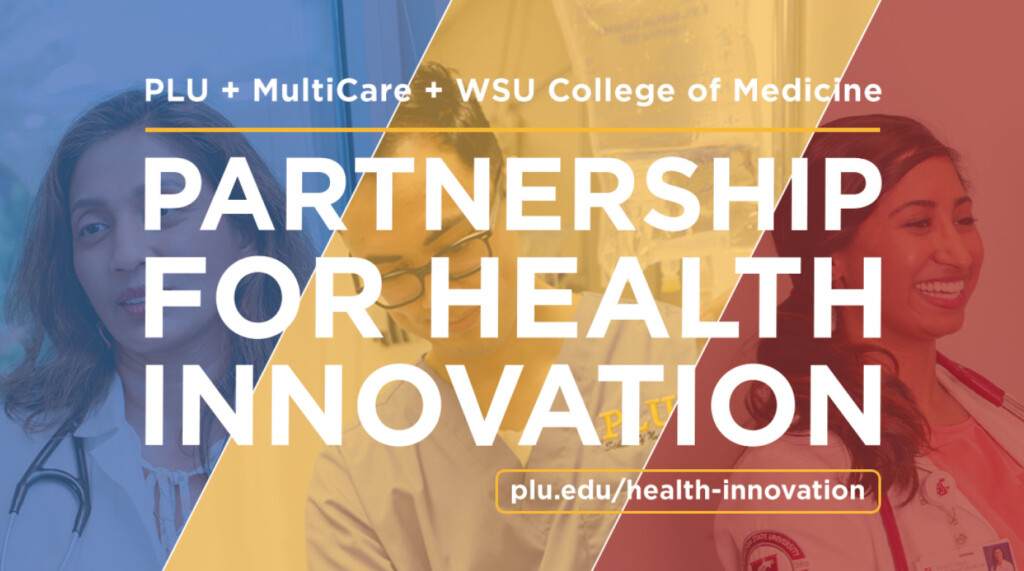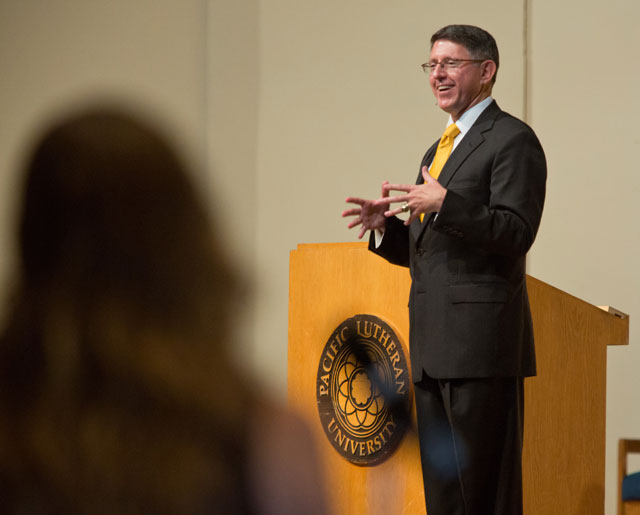Page 68 • (1,156 results in 0.039 seconds)
-

Newborn memories of the “oohs” and “ahs” heard in the womb By Barbara Clements University Communications Newborns are much more attuned to the sounds of their native language than first thought . In fact, these linguistic whizzes can up pick on distinctive sounds of their…
Stockholm. Infants heard either Swedish or English vowels and they could control how many times they heard the vowels by sucking on a pacifier connected to a computer. Co-authors for the study were Hugo Lagercrantz, a professor at the Karolinska Institute in Sweden as well as a member of the Nobel Assembly and Patricia Kuhl, endowed chair for the Bezos Family Foundation for Early Childhood Learning and co-director of the University of Washington’s Institute for Learning and Brain Sciences. The study
-

PLU MESA Day: A Bridge to Success Denner Galindo, left, smiles at his teammate Antonio Reyes as the boys’ stick bridge is tested at PLU’s MESA Day event March 25. (Photo: John Froschauer / PLU) Hundreds of K-12 Students Compete in Annual Event By Sandy…
major event, filling both Olson Auditorium and Memorial Gymnasium, and about 25 PLU staff members—from the Division of Natural Sciences and other departments—volunteer each year, along with members of the community. “This is the Olympics of MESA,” says J.R. Nobles, director of Tacoma/South Puget Sound MESA at PLU. “This is what our students have worked for all year long, to show off everything they’ve learned.” Denner has a lot of learning to show off—although he definitely is not the showy type
-

Fiona Ashton-Knochel ’24 is spending her summer on a bird refuge in Brigham City, Utah. The Environmental Studies major sat down with us to discuss her exciting internship and to offer suggestions for anyone looking to land their own internship working in conservation. Why did…
, and it’s rewarding to juggle my love for the sciences and humanities at the same time. Why did you choose to study at PLU? I study at this school because I feel at home on this campus and in the Pacific Northwest. Specifically, though, there are professors who encourage me to continue learning here—The first person who comes to mind is Dr. Adela Ramos, chair of the Environmental Studies department. She is an inspiration and PLU is so lucky to have her. You are interning at the Bear River
-

Sarah Davis began her PLU journey with the idea that medicine and health care would be the ultimate goal, but then a couple of classes focused on plant development and global agriculture grew a new passion. “I have a family history of agriculture, my grandfather…
gained valuable experience that I will take with me to graduate school. The bio department also offered me a lot of learning opportunities, and the faculty were fundamental to my personal and academic growth.How does your interest in plant sciences intersect with your interest in food and the environment? Food is the most important resource on this planet, and without proper understanding of how extended periods of drought or flooding impact crop yield, we get into dangerous territory with our food
-

Computer science major Chris Holland will graduate with a degree in computer science this December. Throughout his PLU years, Holland has taken advantage of seemingly every learning and resume-building opportunity he’s come across, which have included multiple internships, mentors, and freelance work for local businesses.…
, which helps students learn more about careers in the natural sciences. So far, Holland has had three mentors. The mentors’ experiences provided multiple perspectives, which Holland appreciates. He meets with mentors on Discord or online hangouts like Zoom. “These programs are underutilized,” he says. “It’s like a roommate. You can jibe with them or not—and if you do, you develop a good relationship.” Holland’s favorite experiences so far involve PLU’s small class sizes. “You get special attention
-

More than 140 health care providers, educators, and community leaders gathered earlier today at Pacific Lutheran University for the announcement of the Partnership for Health Innovation. The exciting new partnership unites PLU, MultiCare, and Washington State University’s Elson S. Floyd College of Medicine around two…
-based medical school. The college was created to expand medical education and health care access in communities across the state. The college offers degree and certificate programs in medicine, nutrition and exercise physiology, speech and hearing sciences, health administration and leadership, and medical ethics. Additionally, WSU has three graduate medical education residency programs — internal medicine, pediatric medicine, and family medicine. In addition, the college is home to groundbreaking
-
Biology Courses: BIOL 225 (Molecules, Cells and Organisms) BIOL 226 (Genes, Evolution, Diversity and Ecology) One semester of each of the following is also recommended by many programs: BIOL 342
. The English requirement is intended to demonstrate competency in grammar and composition as well as comprehension and analysis of written work. In general, the English requirement is met by taking courses that schools would recognize as writing or literature courses.Behavioral Sciences: The following course is recommended for anyone entering into the Optometry field. Some programs require one or more social or behavioral science courses while others only recommend they be taken. Please check with
-
Biology Courses: BIOL 225 (Molecules, Cells and Organisms) BIOL 226 (Genes, Evolution, Diversity and Ecology) One semester of each of the following is also recommended by many programs: BIOL 342
. The English requirement is intended to demonstrate competency in grammar and composition as well as comprehension and analysis of written work. In general, the English requirement is met by taking courses that schools would recognize as writing or literature courses.Behavioral Sciences: The following course is recommended for anyone entering into the Optometry field. Some programs require one or more social or behavioral science courses while others only recommend they be taken. Please check with
-
News articles and blog posts from Pacific Lutheran University.
Three students share how scholarships support them in their pursuit to make the world better than ho
-

PLU President Thomas W. Krise welcomes faculty and staff back to campus, highlighting the strengths of PLU and his goals for the future. (Photo by John Froschauer) “A University of the First Rank” By President Thomas W. Krise Good morning and welcome to the 2012…
important to help them understand that the idea of the liberal arts is rooted in ancient Greek and Roman culture and the term describes those skills and subjects that were deemed necessary for the education of free people—libera being the Latin root for liberty. In the medieval period, those arts were identified with seven subjects—grammar, rhetoric, logic, arithmetic, geometry, music, and astronomy. I like to refer to these by name to emphasize that the liberal arts have always included the sciences
Do you have any feedback for us? If so, feel free to use our Feedback Form.


